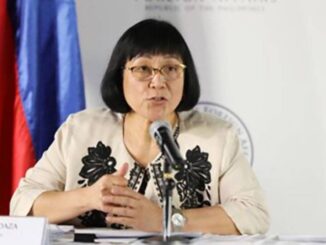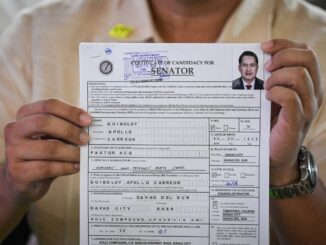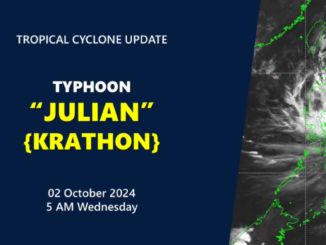
(UPDATES) THE Philippines will “stand our ground” in a dispute with Beijing over the South China Sea, National Security Adviser Eduardo Año said on Friday, eight years after an international ruling against China in the territorial contest.
Tensions over the strategic waterway, a key passage for seaborne trade, have soared in the past 18 months following a series of escalating confrontations between Philippine and Chinese ships.
The most serious happened on June 17, when China Coast Guard personnel wielding knives, sticks, and an axe surrounded and boarded three Philippine Navy boats during a resupply mission to Ayungin Shoal in the Spratly Islands.
While the countries agreed last week to “de-escalate tensions” over the disputed reefs and waters, Año said during a conference marking the anniversary of the ruling by The Hague-based Permanent Court of Arbitration (PCA).
“We will continue to stand our ground and push back against coercion, interference, malign influence, and other tactics that seek to jeopardize our security and stability,” he said.
The Philippines filed a case against China in 2013. Three years later, the Permanent Court of Arbitration ruled in Manila's favor, declaring China's expansive claims had no legal basis. China refused to take part in the proceedings and has ignored the judgment.
Former president Rodrigo Duterte, who took office in 2016, set aside the ruling in exchange for warmer ties with China.
That changed when President Ferdinand Marcos Jr. was elected in 2022, insisting he would not let China trample on Manila's maritime rights.
Since then, diplomatic relations between Manila and Beijing have deteriorated as the Marcos administration pushes back against Chinese actions.
China deploys coast guard and other vessels to patrol waters around reefs claimed by the Philippines, including Ayungin Shoal, which is 200 kilometers from Palawan and more than 1,000 kilometers from China's nearest major landmass, Hainan Island.
The Philippines has deepened defense cooperation with the United States and other countries in the face of China's growing assertiveness.
On Monday, the Philippines signed a key defense pact with Japan that will allow the deployment of troops on each other's territory.
Año said the government would continue to “foster closer ties with like-minded countries” and remained open to discussing “difficult issues.”
The Philippines was “always open to… frank discussion based on mutual respect and sincerity,” Año told the gathering that included ambassadors from the United States, Australia, France and Japan.
“If you call, we will answer,” he said.




Año said the country rejects any attempt to deny its strategic agencies, especially by the use of force that seek to coerce and subordinate the national interests of the Philippines.
He said that respect and adherence to international law “should neither be optional nor should be based on a state's own liking, benefit, or convenience but crucial in ensuring world order.”
“We must then work arm-in-arm to vigorously pursue this collective vision — showing to the world that it is workable and possible to give rise to a free, peaceful, and secured world — if, and only if, we act sincerely and responsibly under international laws that govern, unite, and bind us together,” he said.
Año said efforts are underway to de-escalate tensions in the West Philippine Sea.
“We don't want war,” he said.
Año stressed that the Philippine government will continuously engage, build partnerships, and seek wider international support to “defend and protect what is rightfully ours.”
“We are committed to address and manage difficult issues through dialogue and through diplomacy,” he said.
He said the country will continue to rally its partners and allies, and the Association of Southeast Asian Nations to make a united stance against those that seek to undermine the arbitral ruling and to express the important role international law plays in maintaining peace and stability in the maritime commons.
He said the ruling was a test case for all countries, as the extent to which the international community supports it and seeks to enforce the ruling would have serious consequences for the utility of international law.
Stratbase ADR Institute President Victor Andres Manhit hailed the government's move to boost external defense capabilities, while citing the support of like-minded states to the country's position in the West Philippine Sea.
“We are one with the rest of the world in ensuring that the rule of law prevails. Every nation, regardless of size, or military power, must respect the rights of others and adhere to international law,” Manhit said during the opening remarks for the conference marking the ruling's anniversary.
The Department of Foreign Affairs (DFA) described the award as a reaffirmation of the United Nations Convention on the Law of the Sea (Unclos) and “protects our rights as a coastal state and a seafaring people.”
“Every effort to secure our legitimate interests in our maritime domain is a testament to the determination and courage of the Filipino people while showcasing the Philippines' vision of peace and stability that inspires and resonates beyond the waters of the South China Sea,” the DFA said.
Addressing the conference, Defense Secretary Gilberto Teodoro Jr. said the Department of National Defense is taking the arbitral ruling to heart in its effort to defend the rights and interest of the country.
Teodoro said the award affirmed the Philippines' rights to its exclusive economic zone.
Also on Friday, Sen. Risa Hontiveros renewed her call to declare July 12 as West Philippine Sea (WPS) Victory Day to commemorate the triumph of the Philippines against China in the Permanent Court of Arbitration.
“We should celebrate WPS Victory Day every year to remember our 2016 win and assert our just and rightful ownership of the WPS. This is also an opportune time to show our biggest aggressor, China, that the Philippines will stand as one in the fight for our sovereignty. Let's show them they cannot divide us,” Hontiveros said.
In the senator's Proposed Senate Resolution 674 filed in 2023, she stated that the PCA Ruling held that the Chinese government's claims to historic rights, or other sovereign rights or jurisdiction, concerning maritime areas in the WPS encompassed by the so-called “nine-dash line,” were contrary to Unclos.
“The 2016 victory showed the world that a small country like the Philippines can legally, peacefully, and diplomatically stand up to a big, autocratic country like China. But Beijing's continued threats and intimidation despite the ruling are also a sober reminder to the world that all those who believe in the international, rules-based order must actively come together to safeguard global peace and security,” Hontiveros said.
“The recent Japan-Philippines Reciprocal Access Agreement is a welcome development in consolidating multilateral support from the international community. I also hope we can gather more security agreements with like-minded countries that want to de-escalate the tensions in the WPS,” she said.
WITH AGENCE FRANCE-PRESSE





Be the first to comment